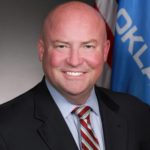By Oklahoma Institute for Child Advocacy CEO Joe Dorman
Decisions are made by those who show up, as quoted by President Jed Bartlet from “The West Wing.” Voters who take the time to cast ballots make the decisions. Oklahoma has one of the worst voting percentages for eligible voters in the nation, so this means a few who show up are deciding elected officials for us all.
Through my time serving as a state representative, I learned the lesson that “the customer is always right” in politics, and those customers are voters. I can recall only a few times when I voted “for my district” instead of my own personal views. I often used my column to educate about policies in advance and why I chose a specific policy side.
I now feel fortunate to work in a field – child advocacy – that often does not come down to partisan dissension, but instead a values system of how children should be treated. Each issue the Oklahoma Institute for Child Advocacy (OICA) promotes is backed by data and case studies showing best practices for how to handle situations covered by the proposed legislation.
As we work with lawmakers who represent districts rather than the entire state, we must seek ways to navigate policy for the best interests of children while understanding views of those in both the majority and minority parties for their districts. Again, issues such as childhood trauma (abuse and neglect), hunger (SNAP), and access to medical care (Medicaid) are usually not partisan; sometimes, though, the pathways to solutions diverge into varying political opinions.
Public opinion weighs into the conversation; it is up to advocates to educate the “customers” and on a wider scale, the general public, who share their opinions with lawmakers. This education also involves the policymakers themselves as they cannot be an expert on every issue put before them.
In contrast, activists want to “storm the castle” and demand rapid change, which is often met by pushback from policymakers. Advocates and activists have their parts to play in the system of government by trying to win over public opinion. I have long subscribed that the solution, while slower, is through systemic change and educating about the impact of policy.
Polling, while not popular when by politicos to make decisions, gives them a picture of where the public stands on issues. For example, the website “538” shows President Donald Trump with a +3.4-approval rating currently in the United States in his first month in office. When you look at the national registration, and then correlate that to Oklahoma, this demonstrates why many of our elected officials have aligned their messaging with President Trump. In a recent Newsweek article, the President’s favorability rate in Oklahoma was reported at 63% with 34% unfavorable.
If you want to be effective in advocacy, you need to learn how to work in the political environment in which we live. Whether an official is extremely liberal or MAGA Republican, each wants better outcomes for children, and that is why the conversations can occur to find solutions, and that is why the conversations must occur.
Do you want to join the conversation? The OICA Child Advocacy Day will be on Tuesday, March 11, at the Oklahoma State Capitol. We not only provide answers for issues facing children, but we also hold a chili cook-off in the parking lot which allows child-serving programs to network with lawmakers and offer solutions.
Please join us on that day for fun, great chili, and even better advocacy for children. You can find more details at oica.org/events about how to sign up to cook or be a sponsor and be a part of the solution.


